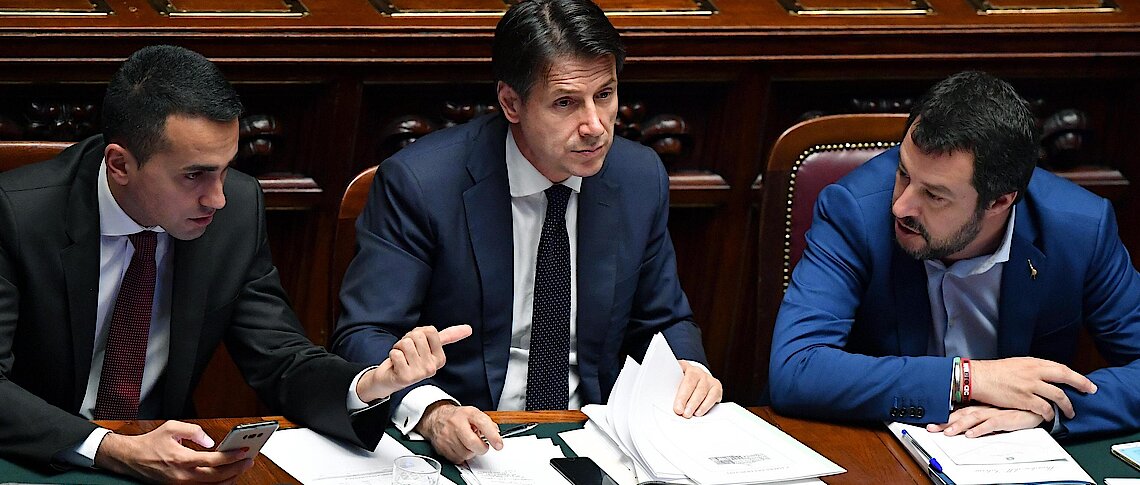Read this article in German or Russian.
Steve Bannon is happy about — indeed perhaps even instrumental in — the formation of an anti-European, anti-immigrant government in Italy. Marine Le Pen, the rightist French politician, is also delighted, calling the new coalition 'a victory of democracy over intimidation and threats from the European Union.' And I’m happy.
Now Bannon and Le Pen are not normally the political company I keep, so before I go on let me make it clear that the victorious parties entering government in Italy — the xenophobic League and the out-with-the-old-order Five Star Movement — bring together bigotry and incompetence to an unusual degree. They are a miserable bunch borne aloft on the global anti-liberal tide.
Still, they won. The results of democratic elections have to be respected. I have immense respect for the wisdom, however hard to discern, of voters, even if I may profoundly disagree with their choices. That is why, when it seemed earlier in the week that Sergio Mattarella, the Italian president, had blocked the formation of this government over concerns that the proposed finance minister favored Italy’s withdrawal from the euro, I despaired.
I am passionate about the European Union, the dullest propagator of peace ever created. I loathe the facile designation of the immigrant or outsider as the source of national woes, a form of scapegoating with a terrible history in Europe and now on vivid display in Donald Trump’s America. I’m all for seriousness of purpose in government, and that cannot include promising handouts for which there are no funds. In short, I see nothing in the League or the internet-propagated Five Star Movement that does not cause me disgust.
Yet, Matteo Salvini, the leader of the League who will become the interior minister, and Luigi Di Maio of the Five Star Movement, who will become the labor and economic development minister (having never held a job worth its name) are right. They are on to something, and that is why they won, just as Trump won because he intuited a seeping anger that too many liberals had ignored.
They are right that almost three decades of globalisation since the end of the Cold War has left too many people behind in too many Western democracies, starved them of hope or even a say, and given them the impression that the system was rigged by elites in Brussels or other metropolitan hubs. The 2008 financial meltdown and the subsequent euro crisis came and went with near total impunity for those responsible. Until Western democracies confront their failings, the tide of popular rage won’t abate.
Italy has a lousy government that may in the end be good for Europe.
The response of Jean-Claude Juncker, the president of the European Commission, to the new Italian government was about as disastrous as may be imagined. It typified the forms of arrogance that have propelled anti-establishment parties to power and laid waste to the mainstream. Stop blaming the European Union, he declared. 'Italians have to take care of the poor regions of Italy. That means more work, less corruption, seriousness.'
Oh, please: Corrupt, unserious, lazy Italians — how many more stupid stereotypes can be packed into a single sentence? Juncker later apologized, but the damage was done. The slip was indicative of problems.
The European Union has failed Italy because promised solidarity in taking in immigrants reaching Europe through Mediterranean routes hardly materialised. In 2017, Italy received more than 60 percent of such migrants. It has failed Italy because the rigid fiscal constraints of membership of the euro — set up to ensure that Italy’s budgetary laxness and administrative inefficiency would not be a problem for Germans — have proved unsustainable, engendering growing resentment toward Chancellor Angela Merkel.
Of course, Italy has also failed itself. Parts of the country are the New York subway writ large, a lesson in what happens when waste becomes endemic and needed investment is deferred.
Now let Salvini and Di Maio and Giuseppe Conte, the new prime minister whose inflation of his academic credentials is not reassuring, go to work on the mess. It’s much better to have them fail on the inside than have them rail from the outside. It’s better to have them lose support through failure than gain support through bluster.
The removal to a lesser job — European affairs minister — of Paolo Savona, the euroskeptic who had been the designated finance minister, was a clever maneuver that not only saved the coalition but also reinforced democracy. With democracies, you get to throw the bums out when they mess up, not block them from assuming the power they won at the ballot.
I know, Hitler was appointed chancellor in 1933 after a democratic election. Vigilance is imperative, particularly in these troubling times when independent judiciaries and a free press are under consistent attack. But a core beauty of the European Union is that its interlocking institutions are designed precisely to ensure that no country can go off on what the Germans call a Sonderweg — the sort of wayward path of nationalism and mysticism and racism that led Germany, and all of Europe, to ruin.
Italy has a lousy government that may in the end be good for Europe.
I’ll take the long view and raise a cheer for that.
© New York Times






